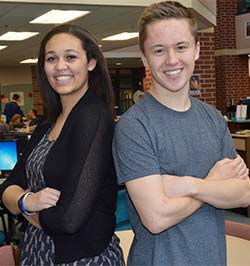Rockford High School senior Ethan Begalka has done his homework on what it will cost him to go to college. He doesn’t like the math.
His research shows 70 percent of college graduates shouldering student-loan debt, at an average of about $33,000, to be repaid at 7 to 8 percent interest. Ethan calls those numbers “absurd.”
“It’s really unrealistic, especially when you have a 17- or 18-year-old kid making financial decisions that will last a lifetime,” he added. “That’s a lot to take on.”
|
Easier Access, Lower Cost The Making Education Accessible and Affordable Act aims to expand options for high-school students to earn college credit, thereby increasing enrollment and reducing tuition costs. Using money from existing federal funding, it would provide grants to institutions of higher education to be used for:
The National Alliance on Concurrent Enrollment Partnerships estimates 1.9 million high school students were enrolled in a college course during the 2014-2015 school year. The bipartisan bill was introduced by U.S. Senators Gary Peters, D-MI, and Bill Cassidy, R-LA; and Congressmen Jared Polis, D-CO, and Tom Reed, R-NY. |
Reducing student debt is one reason he supports proposed federal legislation to help colleges and universities offer courses to high-school students at no cost. Co-sponsored by Michigan Sen. Gary Peters, the bill would expand programs such as the one in which Ethan and about 130 other Rockford students earn credits from Ferris State University for courses taught at their school.
The Making Education Accessible and Affordable Act would provide grants to help colleges and universities carry out such programs, train teachers for them and support activities such as course design and student counseling.
Peters unveiled the bill in a Feb. 22 press conference attended by Ethan and two other Rockford High students, along with Superintendent Michael Shibler. In addition to the cost savings, the academic rigor of college-level classes is invaluable preparation for higher education, said senior Kaelah Brauher.
“Just the values you learn and the study habits that you acquire are immensely helpful,” Kaelah said.
Two Mascots, One Price
Known as concurrent enrollment, the Rockford program is one of several models that would be supported by the legislation. Another is middle college, where students can earn an associate’s degree by taking classes on campus while adding a year to high school. Fifteen Kenowa Hills middle-college students earned degrees at Davenport University last year, collectively saving more than $500,000 in tuition that was covered by the district.
Peters said he wants to increase access to programs that can save students up to two years of college tuition and fees while increasing their college enrollment and graduation rates.
“The escalating cost of higher education should not deter hardworking, motivated students from obtaining a quality higher education,” Peters said at the press conference at Kendall College of Art and Design of FSU. “Students will save time and money (with these programs) as they kick-start their careers through a personalized curriculum.”
Shibler said he’s happy to help make programs like Rockford’s available to more schools. Instituted in 2013-14, the Woodbridge Ferris Early College Program enables students to earn both college and high-school credits in courses taught by FSU-approved Rockford teachers. The district covers the tuition costs at one-third the normal rate, and credits are transferrable to most Michigan colleges and universities.
“Those in the know think this partnership between Rockford and Ferris State University is a model for other districts to consider emulating, and it really is,” said Shibler, adding he wants to increase Rockford students enrolled by at least 15 percent.

Less Transition Shock
Besides reducing the debt many college students face, the program’s rigorous course work should reduce the failure rate of college freshmen, Shibler added.
“It’s a shock to a lot of students when they get on campus their freshman year. They’re dealing with incredible freedom they’ve never had before, and they have to be disciplined to study.”
That scenario concerns Ethan and Kaelah, who were joined at the press conference by Jake Christy. Kaelah doesn’t expect her FSU credits will transfer to Duke University, and Ethan is dubious about how many will apply to his likely choices of the University of Massachusetts or the University of Michigan, which does not accept concurrent enrollment classes. He hopes to be able to test out of some courses.
But regardless of financial factors, they say their college-level courses are providing an invaluable launching pad for campus life.
“It gives us a glimpse as to what we can expect in college, so we’re not just thrust into these new college courses,” said Kaelah, who’s eyeing a major in political science. “Once we get into college, we’re going to have so many new experiences. It can make that transition a lot easier.”
Taking courses from familiar high-school teachers has helped them handle the challenging coursework, the students say. Ethan adds he’s also learned “a ton of time management” and to work more independently: “I like the concept of your education is in your own hands.”
And though they personally won’t realize much if any cost-savings, they say reducing college costs would be a huge help to countless others.
“If you’re being limited just by your parents’ financial situation, that’s terrible,” Ethan said. “That limits so many great people from achieving their dreams.”
CONNECT









